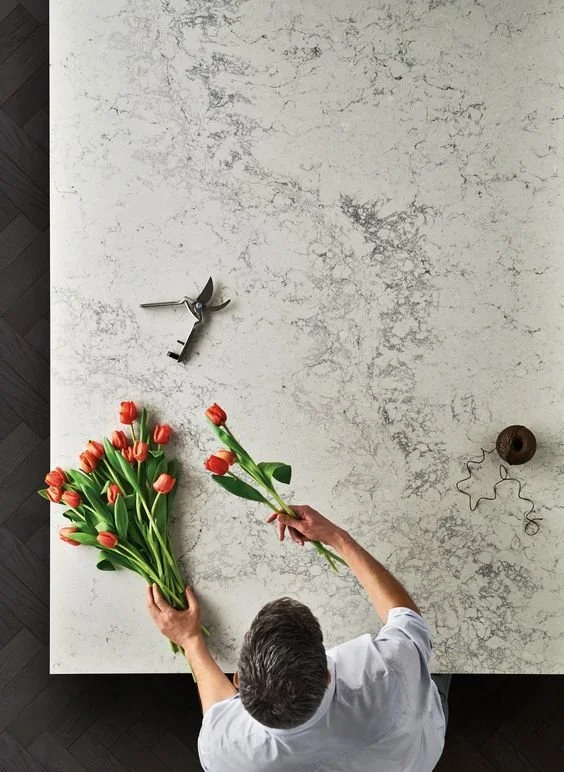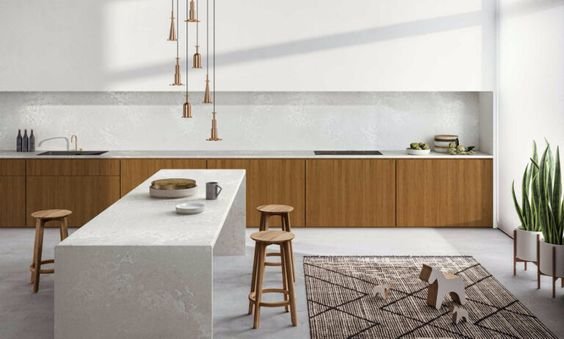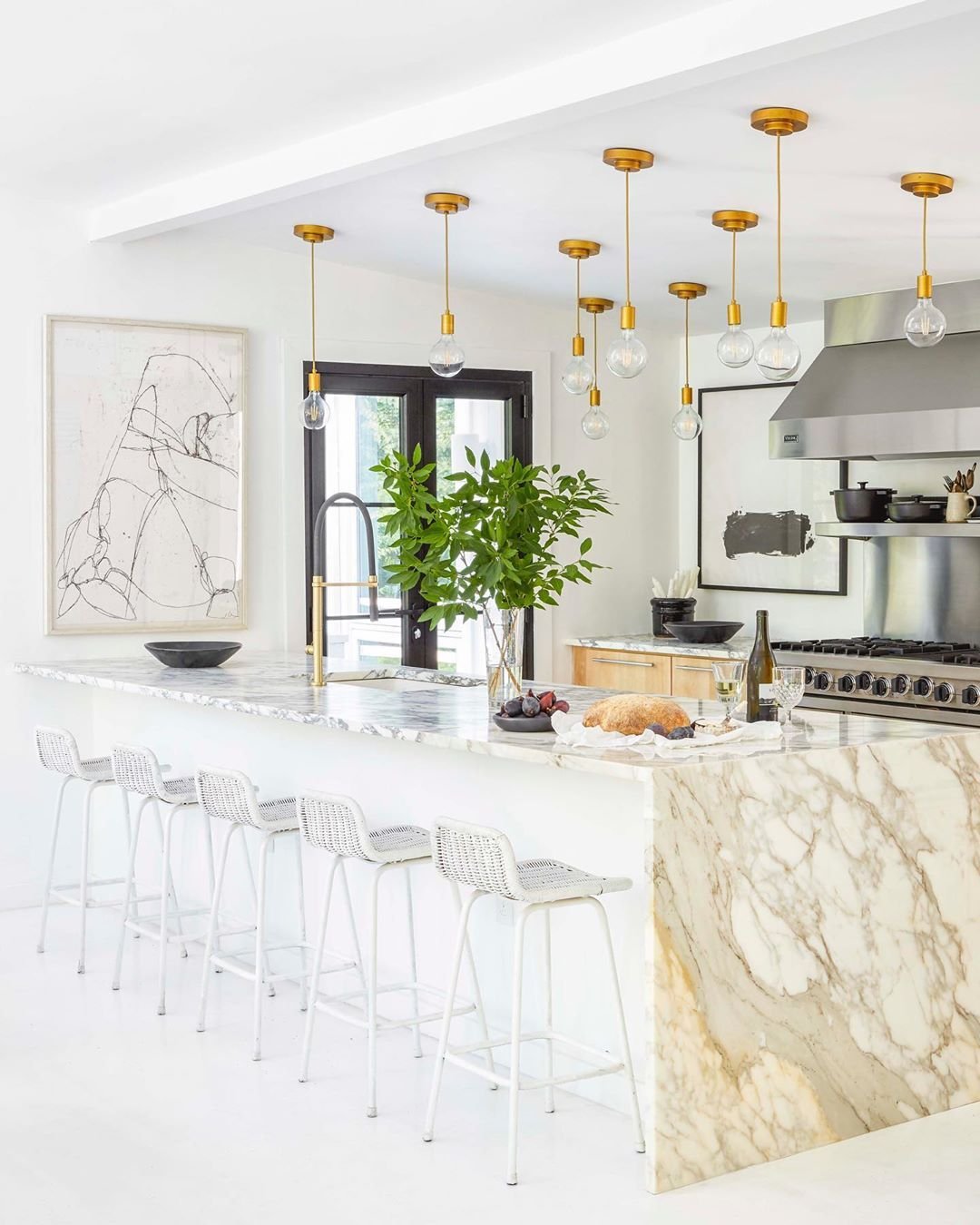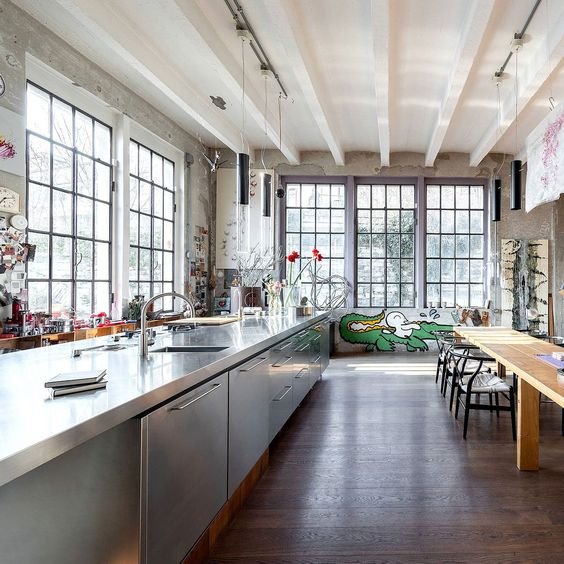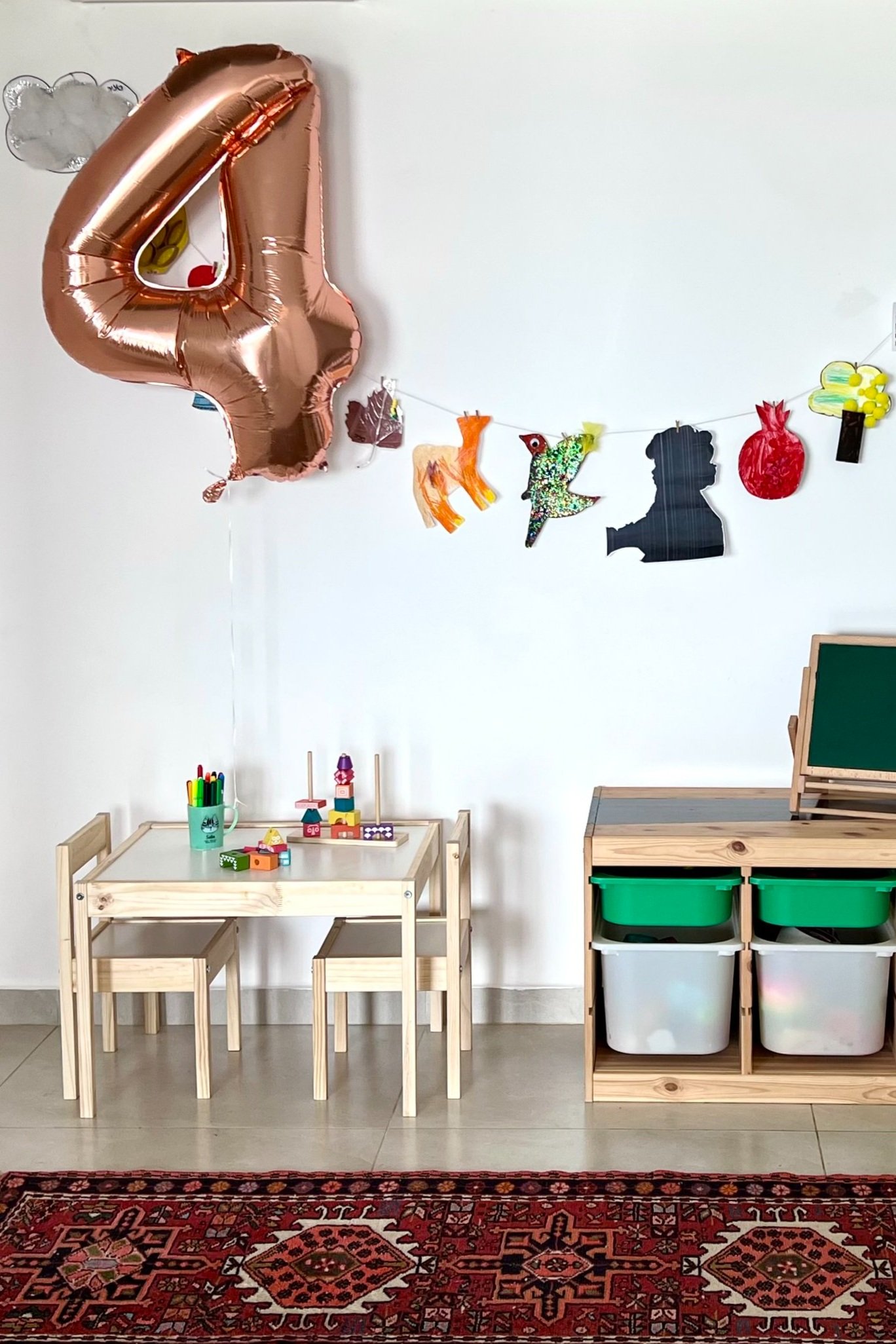Notes on Kitchen and Bathroom Countertops
Quartz countertop (image source)
The variety of countertop materials and brands available will make your head spin, and the roundup of types below won’t necessarily stop the spinning. But you will start to understand what options are available and consider what your priorities are with respect to durability, affordability, and beauty.
When you purchase your countertop (shayish - שיש):
Talk to the supplier about how many pieces it will come in. The more pieces it comes in, the more seams you’ll see (and potentially need to maintain).
Ensure you are purchasing the material and brand you are seeking and not a knockoff; check for seals and certificates.
Ask whether your warranty is dependent on using an installer certified by the company.
Note that I’ve borrowed text liberally from the sources listed at the end of this post.
Quartz countertop (image source)
Engineered Stone
Quartz
“Quartz countertops are engineered stone products that may contain a large percentage of natural quartz but may also include other minerals. They are not slabs of quarried stone but are instead formed from stone byproducts that are ground up and formed into slabs for countertops and other products.” (The Spruce)
Leading suppliers: Caesarstone (an Israeli company with 90% of the market share), Silestone (owned by Spanish company Cosentino and has antimicrobial properties)
Pros
Relatively easy to maintain, no sealing required
Slabs are uniform, with no imperfections
Can be custom-fabricated in any size and shape
Relatively scratch and stain resistant (with consistent cleaning — spills cannot be neglected)
Natural appearance, stone-like feel to the touch
Cons
Expensive
Countertops are very heavy
Can be stained if neglected
Can be warped by extreme temperature changes or contact with strong chemicals or detergents
Affected by UV rays over long periods
Quartz cleaning solutions Facebook users swear by: Astonish scrub, Cillit Bang spray, Sano Javel
The key is to treat stains immediately. Don’t leave anything on your countertop overnight or long term (coffee spill, turmeric, a pot you washed), though you can sometimes still clean these later with a lot of effort (and nerves).
Porcelain
Porcelain is heat and stain proof, but it also has a more synthetic feel. Those who want to be able to put hot pots directly on their countertops and not worry about stain cleanup should consider this option. Those who love the luxurious feel of stone may not be satisfied with porcelain.
Leading suppliers: Caesarstone, Laminam, Dekton, Infinity, Neolith
Pros
Extremely heat-resistant
Stain proof
Unaffected by UV rays
Can be installed on top of existing countertops
Cons
More expensive than quartz
Thinner than quartz
Fragile upon installation and can chip easily
Veining often less real-looking and texture feels more synthetic than stone-like
There is hot debate in Facebook groups about Dekton’s durability. Some say Dekton is the most durable and sophisticated option and won’t chip with normal use, while others say suppliers are wary of working with the product because of chipping potential. Dekton has a higher amount of glass in it than other porcelains, so it can more easily crack when hit hard or on its edges. However, designers say the durability has improved over the past five years.
Corian countertop with integrated sink (image source)
Synthetic
Solid-Surface Material (Corian)
Corian, by DuPont, is the leading synthetic countertop brand in Israel (imported). Its main advantage is that “pieces can be glued together with a solvent so that the seams are entirely invisible. This gives the appearance of a huge, continuous slab of unseamed countertop,” for example for creating a seamless countertop–sink integration. (The Spruce)
Pros
Resists staining
Seams are virtually invisible
Damage can be easily sanded out
Large range of colors and patterns
Integrated sink/countertop units are available
Cons
Moderately expensive
Can be scratched by metal
Prone to heat damage
Granite countertop (image source)
Natural Stone
Granite
“Granite is a purely natural stone that comes directly from stone quarries and is then cut into thin slabs, polished, and fabricated into countertops.” (The Spruce) “Its natural appearance has a medium- to course-grained texture and comes mostly in medium to dark colors with a polished surface. In Israel, granite is imported mainly from Italy and South America.” (Buy It in Israel)
Pros
Strong, durable, and heat-resistant
Least absorptive of the available countertops
Nearly maintenance-free when treated with newer sealers
Every slab is unique
Cons
Very expensive
Slabs may have imperfections/variations
Can crack if stressed or improperly installed
Stone is porous and requires sealing to avoid stains
Marble countertop (image source)
Marble
The crème de la crème of natural stone, only marble has the much-prized unique veining detail running through its full depth. But it’s a nightmare to maintain in the kitchen.
Pros
Beautiful stone with unique veining
Heatproof
Cons
Stone is porous and stains easily (even by water left on too long)
Requires annual sealing
Expensive
Can be scratched; repairs are difficult
Quartzite
“Quartzite is sandstone fused with sparkly quartz crystals using heat and pressure. Quartzite looks more like marble or granite with delicate veining and usually costs a little more” than quartz. (The Spruce) It’s often white and gray but can have colorful undertones.
Pros
Strong and durable (more than marble)
One-of-a-kind natural appearance; glassy look that resembles marble
Cons
Stone is porous and requires annual sealing to avoid stains
Avoid contact with extreme heat
For extra protection, choose a honed rather than polished finish.
Stainless steel countertop (image source)
Alternatives to Stone
Stainless Steel
Consider stainless steel for a modern, industrial look. This can work well in an office, where cooking and cutting are minimal.
Pros
Heat- and water-resistant
Easiest of all countertop materials to clean
Cons
Noisy
Very expensive to fabricate
Can be easily scratched; not a cutting surface
Material can leave fingerprints
Butcher block countertop (image source)
Wood/Butcher Block
Wood countertops come in a variety of colors and finishes and give a rustic look to the kitchen. However, they require a lot of maintenance and are not as durable as the more popular stone and synthetic alternatives. (Buy It in Israel)
Pros
Relatively easy to clean
Long-lasting when properly cared for
Can be sanded and resealed, as needed
Cons
Fairly expensive
Surfaces can be scratched and cut by knives
Can be damaged by water and stains over time
Bacteria can be a problem if not properly maintained
Wood is subject to cracking if not maintained; must be oiled and sealed frequently
Glass
“Similar technology [to engineered stone] is now being used in so-called glass countertops, which consist of particles of recycled glass blended with resins and shaped into countertop slabs. Consumers keen on being on the cutting edge may want to consider glass as well as quartz countertops.” (The Spruce)
Pros
Non-porous
Sanitary
Heat- and stain-resistant
Cons
Scratches easily
Expensive
Material can leave fingerprints and water spots (not practical for families)
Laminate
“Laminate counters … are plastic-coated synthetics with a smooth surface that's easy to clean. Countertops are made by bonding the laminate sheets to a particleboard (MDF) core. Laminate countertops can be purchased as pre-formed segments (called ‘post-form countertops’), or custom-fabricated to specifications, either on-site or in a fabrication shop.” (The Spruce).
Popular supplier: Formica
Pros
Very easy to maintain
Thousands of options available
Very inexpensive
Cons
Seams are always visible
May be viewed as too average by potential home buyers
Surfaces can be scratched and chipped; damage is almost impossible to repair
I read on a Facebook thread that someone had trouble finding a contractor to install a laminate countertop for fear of moisture damage. It’s a less popular option in Israel.
Concrete countertop (image source)
Concrete
“If you have countertops in unusual shapes, or if you want a truly unique kitchen, concrete may be a good choice for your countertops. Due to their heavy weight, concrete countertops are usually cast in forms right in your kitchen.” (The Spruce)
Pros
Can be color-tinted
Heat- and scratch-resistant
Decorative textures and colors are possible
Cons
Cracking may occur over time
Costs are high due to custom work
Surface is porous unless regularly sealed
Tile countertop (image source)
Ceramic Tile
“Ceramic tile is durable and easy to clean, and it is considerably less expensive than natural stone, quartz, or solid-surface countertops, especially for DIYers willing to do their own work. Recent innovations in porcelain tiles offer many more design options than ever before, including tiles that look like wood, marble, or even leather or cork. Ceramic and porcelain tiles offer more design options than nearly any other countertop material.” (The Spruce)
Pros
Easy to clean (grout aside)
Usually affordable
Immune to heat damage from hot pans (choice of tile dependent)
An enormous range of colors and styles available
Cons
Custom tiles can be very expensive
Tile are brittle and may crack under impact
Grout lines can stain and are difficult to clean
Edges require skilled installation for a clean look
———
Sources
Kitchen countertops in Israel: https://www.buyitinisrael.com/news/kitchen-countertops-in-israel/
Top kitchen countertops:https://www.thespruce.com/top-kitchen-countertops-1977143
Quartz vs. granite: https://www.thespruce.com/quartz-vs-granite-countertops-1822078
Quartz vs. porcelain: https://graniteselection.com/blog/quartz-vs-porcelain-countertops-which-one-is-the-best/
Corian vs. granite: https://www.thespruce.com/corian-vs-granite-which-is-better-1822082
Marble: https://www.thespruce.com/kitchen-marble-countertops-1822076
Facts about quartz countertops: https://www.thespruce.com/facts-about-quartz-countertops-1821233
Super White Quartzite everything you need to know: https://aquakitchen.com/super-white-quartzite-everything-need-know/amp/
Tips from the trade quartz vs. quartzite: https://www.msisurfaces.com/blogs/post/2017/10/09/tips-from-the-trade-quartz-vs-quartzite-countertops-what-is-the-difference-anyway.aspx
Quartzite countertops vs quartz countertops: https://www.caesarstoneus.com/blog/quartzite-countertops-vs-quartz-countertops/
The Building in Israel Facebook group
